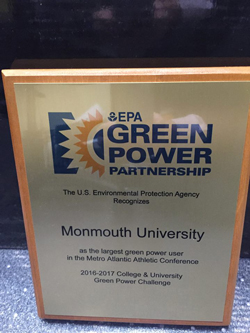Monmouth University was recently recognized by the Environmental Protection Agency (EPA) as a top green power user in the Metro Atlantic Athletic Conference (MAAC) for 2016-2017. The University is also encouraging and working for increased sustainability efforts for 2018.
The University received this award in April of 2017, and continues to produce upwards of 12 million kilowatt-hours annually, which equates to 12 million hours of energy. According to Patricia Swannack, the Vice President of Administrative Services, Monmouth University has been able to sell additional solar energy harvested on campus.
The campus began harvesting solar energy in 2006 beginning with four buildings, and had grown to seven buildings in 2011.
“Sustainability efforts are good for everyone and the entire planet. We are proud of our efforts to be green and are always looking for ways to do more,” said Swannack. “Other things we do throughout campus daily [include]: Water-saving devices used in all campus rest rooms, showers, and new plumbing purchases [and] energy consciousness in the purchase of lighting and electrical devices.”
Buildings throughout the campus, including the OceanFirst Bank Center, Bey Hall, and Plangere use retro-fit LED lighting. These lights are also present in 90 percent of the lights in the parking lot. According to Swannack, these lights result in an annual reduction of 594,524 kilowatt-hours of electricity.
“I believe that renewable energy is critical for the future,” said Dickie Cox, an assistant professor of communication, “I would encourage folks to investigate the work of Dr. David Orr who has devoted his career to educating others about impeding climate collapse and environmental design and education. We have a few decades to stabilize the relationship between our practices and our biosphere. Energy is major consideration in that relationship.”
“[Green energy] is critical,” said Scott Jeffrey, Ph.D., an associate professor of marketing and decision sciences. “The world cannot continue using fossil fuels at this rate. The economists might say that the market will dictate this as fossil fuels become more scarce, but given climate change and the pace of that change, we need to get to renewables only very quickly.”
Monmouth University has also developed multiple partnerships to increase its sustainability beyond green energy. Recycling programs for repurposing e-waste is achieved through a partnership with Computers for Kids of America and clothing and books are recycled with the Big Brothers Big Sisters of Monmouth County during residence hall clean-ups.
“MU is attempting to make strides in sustainability beyond energy usage with single-stream recycling and work with food services about food waste,” said Jeffrey. “The Urban Coast Institute (UCI) is also sponsoring mini-grants on sustainable plans for the shore.”
“As a student, it is very important to my peers and I to see efforts for sustainable energy at Monmouth,” said Jon Bass, a senior music industry student. “If universities like Monmouth did not explore green energy and sustainable practices then the university would be failing its students. If in the future the planet is not healthy, then our future is in grave danger and our education is meaningless because humans require clean air and water to survive, which is currently being polluted by use of fossil fuels.”
The University has received multiple green energy related awards by organizations including NJHEPS (2006), National Wildlife Foundation (2007), EPA (2008, 2017), and various others. The full list of sustainability and green energy awards is available on the University’s website.
The University Sustainability Advisory Council is available for students and faculty to contribute ideas and opportunities to increase campus environmental stewardship, and green technology and operation advancements.


